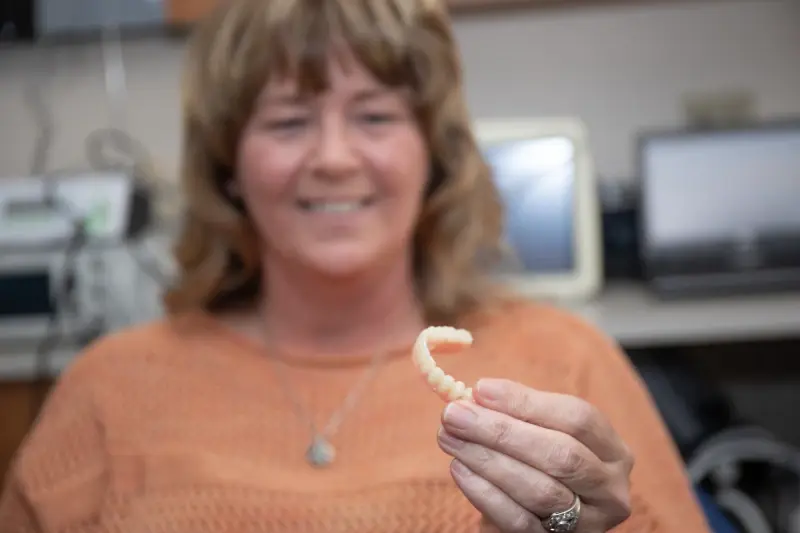There is no question that dental implants are a great way to restore your smile following tooth loss. Our office in Quincy, MA, is proud to provide this dependable form of restoration to our patients.
A variety of implant solutions are available in our practice, along with pre-operative procedures; this allows us to meet the needs of every patient and deliver the best results possible. Call us today to schedule a consultation!
What are Dental Implants?
Dental implants are the modern solution to missing teeth. Unlike traditional dentures, which can slip and be uncomfortable, or bridges, which rely on adjacent teeth for support, dental implants are a permanent solution that looks, feels, and functions just like your natural teeth. Made of titanium, dental implants are surgically placed in your jawbone, where they bond with your natural bone to provide a strong and stable base for your new tooth.
If you’re considering dental implants, it’s important to understand the procedure and what it entails. To determine whether dental implants are right for you, the first step is to consult with our team, so we can answer your questions and assess your individual situation; from there, we can describe what your treatment plan entails.
The Benefits of Implants
Compared to other tooth replacement options, dental implants offer a number of benefits. Often considered the most natural solution for replacing missing teeth, even the design of the implants is based on the natural tooth structure – all the way from root to crown!
- One of the top benefits of dental implants is their ability to preserve your jawbone and prevent it from deterioration. Once a tooth is lost, the bone that supported it will begin to shrink as a result of diminished stimulation. This can lead to a change in your facial structure that results in loose skin and wrinkles – making you look older than you really are. Dental implants are the only tooth replacement option that helps to prevent this problem from occurring.
- Another fantastic benefit is that dental implants are incredibly durable and long-lasting. With proper care, they can last a lifetime! This is in contrast to other options like dentures or bridges, which will typically need to be replaced or altered every few years.
- Dental implants also don’t require any special care beyond what you would normally do to take care of your teeth. Brushing and flossing regularly and visiting your dentist for regular cleanings and checkups are all that’s needed to keep your implants healthy and your smile sparkling clean.
- Finally, dental implants can restore the full function of your smile. Bonded directly to the jawbone, they effectively restore the full bite force – allowing you to eat all of your favorite foods without worry.
What Affects the Cost of Implants?
Dental implants are a major investment, but they are also an investment in your health and your quality of life. The cost of dental implants varies depending on a number of factors, including the number of implants needed, the type of implant chosen, and the need for any preliminary procedures. This may include bone grafts, extractions, or treatments for any current conditions affecting your general wellbeing or oral health.
Ultimately, the best way to determine the cost of your dental implants is to consult with our team at MassOMS. Together, we will review your unique situation and develop a treatment plan that meets your needs, budget, and goals.
Bone Grafting
A bone graft is a surgical procedure in which new bone material is placed into the jawbone to provide a solid foundation for dental implants. We may suggest this surgery if we find that you have insufficient bone density in your jaw to support the restoration. This may be the case if you have experienced bone loss due to periodontal disease or have been missing your teeth for an extended period of time.
- During the procedure, a small incision is made in your gums to access the bone.
- The new bone material is then placed into the area and covered with a collagen membrane to stabilize the graft for healing.
- The incision is then closed with sutures.
You will be placed on a soft diet for the first few days following the surgery to prevent trauma to the surgical site. It generally takes several months for the new bone to fuse with your natural bone. Once this has occurred, you will be ready to proceed with the implant process.
Single Tooth Replacement
One of the styles of implants we offer in our office is single tooth replacement restorations. This implant is designed to support a single dental crown and effectively replace one tooth. We often find that patients need this type of implant following an injury or due to extensive tooth decay resulting in tooth loss.
The components of a single tooth implant generally consist of three separate pieces: the implant itself, an abutment, and the dental crown.
- Once the implant is placed, the abutment is then attached to the implant.
- The abutment functions as a connector piece between the implant and the dental crown.
- Once the abutment is connected, we will take an impression of the area in order to create and attach a custom dental crown.
Implant-Supported Bridge
If you have a series of multiple missing teeth, we offer implant-supported bridges as a great way to restore your smile. This type of dental bridge uses implants to support the false teeth rather than relying on the adjacent teeth for support; unlike traditional dental bridges, this bridge can preserve the health of your remaining natural teeth.
Similar to the design of single tooth replacements, implant-supported bridges utilize an abutment to connect the implant to the prosthetic restoration. The entire bridge is custom-made and anchored in place by two implants on either side of the smile gap.
Implant-Supported Dentures
For patients who are missing an entire arch of teeth, implant-supported dentures offer a more secure and comfortable alternative to traditional dentures. They are designed to be placed on a small number of implants (usually four), which provides greater stability and prevents them from slipping or moving around in the mouth. Implant-supported dentures also help to preserve the bone in the jaw and prevent the effects of jawbone deterioration.
Unlike the above styles of implants, implant-supported dentures are not a fixed restoration. They can be removed for cleaning and require the same type of care as traditional dentures. However, they do offer a more secure smile solution and a much better bite force than traditional dentures alone.
Implant 1-2-3 System
As a part of our exclusive Implant 1-2-3 System, we are making it more quick and convenient than ever before for patients to restore their smiles! In as little as three appointments, you can walk out of our office with a brand-new smile that looks and feels completely natural.
- In step one, we will begin preparation for the process! This involves a consultation to assess your candidacy for dental implants, as well as imaging and x-rays of the mouth.
- In step two, we will place the implant itself! This is a quick and easy process that is completed right in our office.
- In step three, we will attach the restoration, which can be anything from a single tooth, a dental bridge, or a full denture.
You’ll be amazed at how natural your new teeth look and feel, and you can finally say goodbye to the gaps in your smile! If you’re ready to get started on the path to a brand-new you, call our office today to schedule a consultation.

